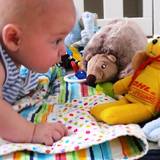Shop
01836
https://www.under5s.co.nz/shop/Hot+Topics+Articles/Child+Development/Managing+the+witching+hour.html
Managing the witching hour
|
The witching hour can start without warning and is often longer than an hour! The calm, quiet baby or toddler you once had turns into a crying inconsolable child in no time at all, usually around the same time every day. So what can you do?
|
You might also be interested in ...
Do you have a gifted child?
So how do you know if you have a gifted child? We take a look at some of the characteristics of gifted children, the meaning of giftedness, whether we should recognise gifted children and what to do if you feel you child is gifted.
Play ideas for young babies
It's often hard to know how to play with young babies and how to keep them entertained. However, spending time together and interact with them will keep them amused for hours. Have a go at these play ideas with your newborn or young baby this week.
join usJoin us on social media for all our latest news. |
sign upSign up and receive our latest newsletters. |
|







Often during the witching hour, the calm, quiet baby or toddler you had a few minutes ago turns into a crying inconsolable child in no time at all, usually around the same time every day.
Our helpful tips on managing the witching hour will help see you through this challenging time of the day.
Managing the witching hour
What is the witching hour?
For some, the witching hour happens around late afternoon or evening mealtime, for others it’s later in the evening, in the middle of the night or early hours of the morning. Whatever the time of day, your little one will cry and cry and nothing seems to help soothe them.
Unfortunately there’s no quick fix to the witching hour! You try anything you can think of to comfort your child, often to no avail.
The best thing to do is accept that the witching hour meltdowns are quite normal and put steps in place to make life a little easier for yourself.
The main reason for the change in your child is because they are tired after a day of stimulation. The end of the day is naturally a time of low physical energy and all this tumult is too much for them.
So what can you do?
9 Tips on Managing the Witching Hour
1. Stay positive
2. Stay calm
3. Be prepared
4. Be available
5. Don’t take it personally
6. Get some fresh air
7. Playing music
8. Look for distractions
9. Have patience
More baby articles to enjoy
- Teaching babies the difference between night and day
- Benefits of baby wearing
- Baby naps - daytime sleep tips
Image source: ecclesandbosco.blogspot.com